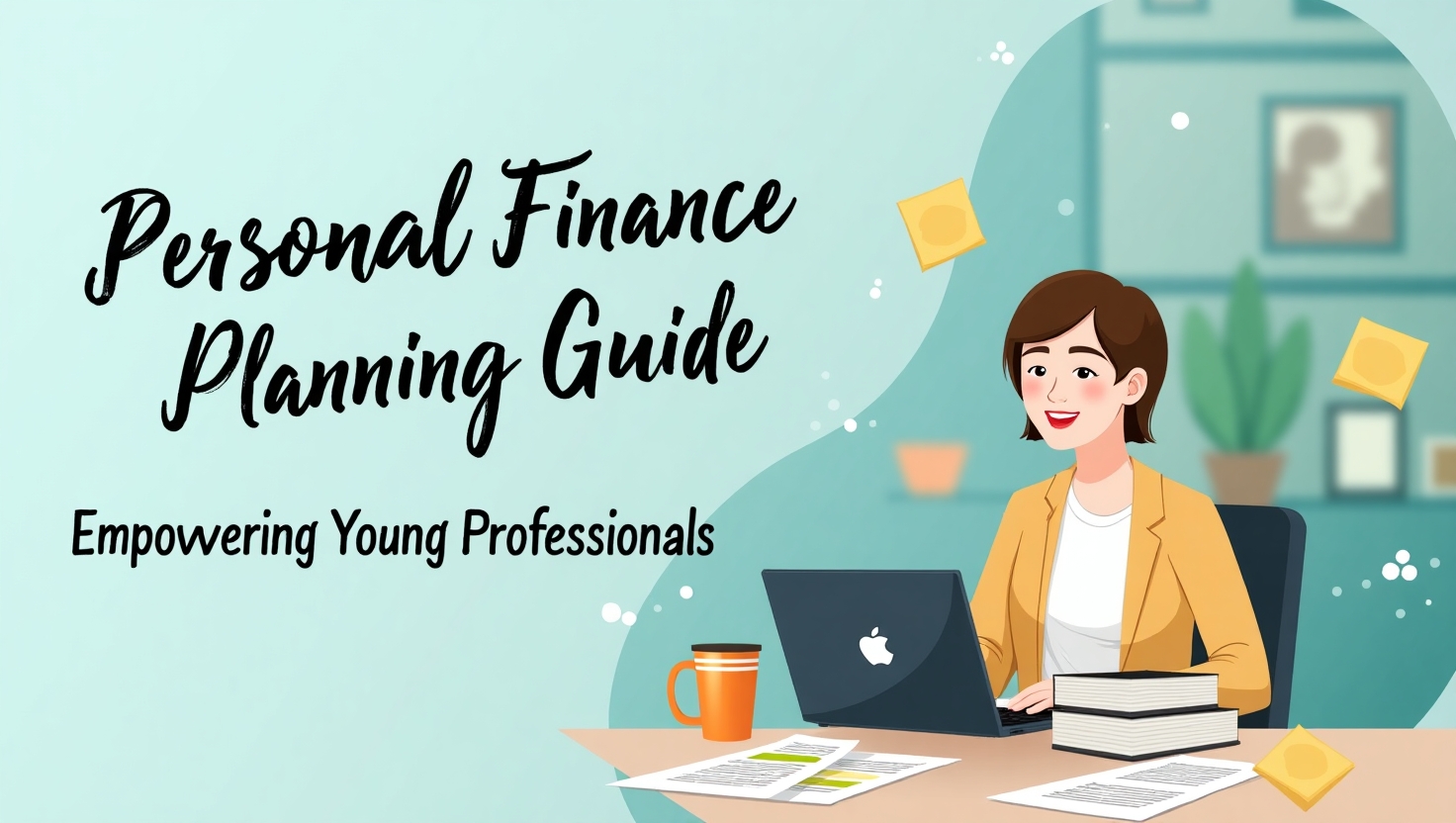Personal Finance Planning Guide for Young Professionals in the USA
Entering adulthood comes with both freedom and responsibility, especially when it comes to managing money. For young professionals in the USA, creating a solid financial foundation is critical for long-term success. Whether you’ve just landed your first job or are navigating your late 20s, understanding personal finance is the first step to building wealth and avoiding common financial pitfalls.
This comprehensive personal finance planning guide for young professionals in the USA will walk you through budgeting, saving, investing, managing debt, and setting future goals—so you can take control of your money from the start.

1. Understanding the Importance of Personal Finance
Personal finance isn’t just about spreadsheets and bank balances—it’s about financial independence and peace of mind. With rising living costs, student debt, and economic uncertainty, young professionals need to be proactive with their money.
By learning how to plan your finances early, you can:
-
Avoid living paycheck to paycheck
-
Build a strong credit score
-
Save for emergencies and retirement
-
Afford major life goals like buying a home or starting a family
2. Start with a Budget
Budgeting is the backbone of financial planning. It gives you a clear picture of your income, expenses, and spending habits. Use the 50/30/20 rule as a starting point:
-
50% for needs (rent, groceries, bills)
-
30% for wants (entertainment, travel)
-
20% for savings and debt repayment
Tips for Effective Budgeting:
-
Use free apps like Mint, YNAB, or EveryDollar
-
Track every expense for at least a month
-
Set spending limits for different categories
-
Adjust your budget as your income grows
3. Build an Emergency Fund
Life is unpredictable. Having an emergency fund can save you from going into debt during tough times. Experts recommend saving 3 to 6 months of living expenses.
How to Start Your Emergency Fund:
-
Open a separate high-yield savings account
-
Automate monthly transfers (even $50/month adds up)
-
Use windfalls (tax refunds, bonuses) to boost savings
Your emergency fund is not for vacations or new gadgets—only for real emergencies like job loss, car repairs, or medical bills.
4. Eliminate High-Interest Debt
One of the fastest ways to sabotage your finances is by ignoring high-interest debt, like credit cards. The longer you carry balances, the more you pay in interest.
Strategies to Pay Down Debt:
-
Avalanche method: Pay off highest interest debt first
-
Snowball method: Pay off smallest balances first for quick wins
-
Consider balance transfer cards or debt consolidation loans
-
Make more than the minimum payment each month
Avoid unnecessary debt and treat credit cards as a tool, not extra cash.
5. Set Financial Goals
Goals give your money purpose. Whether it’s saving for a car, traveling, or retiring early, clear goals help you stay focused and motivated.
Short-Term Goals (1-3 years):
-
Pay off credit card debt
-
Build emergency fund
-
Save for a vacation or new tech
Mid-Term Goals (3-7 years):
-
Buy a home
-
Start a business
-
Save for a wedding
Long-Term Goals (7+ years):
-
Financial independence
-
Retirement planning
-
Children’s education fund
Write down your goals and review them regularly. Use SMART goals—Specific, Measurable, Achievable, Relevant, Time-bound.
6. Invest Early and Consistently
Time is your greatest asset as a young professional. Investing even a small amount early can lead to massive gains over time thanks to compound interest.
Beginner Investment Tips:
-
Start with employer-sponsored 401(k)—especially if they match contributions
-
Open an IRA (Traditional or Roth)
-
Use robo-advisors like Betterment or Wealthfront if you’re unsure
-
Invest in low-cost index funds or ETFs
Even investing $100/month in your 20s can grow to over $150,000 by retirement.
7. Learn About Taxes
Understanding taxes helps you keep more of your paycheck and make smarter money moves.
Key Tax Considerations:
-
Understand your tax bracket
-
Claim eligible deductions (student loan interest, education expenses)
-
Contribute to tax-advantaged accounts like 401(k) and HSA
-
Use tools like TurboTax or H&R Block, or consult a CPA
Avoid tax season stress by organizing receipts and tracking expenses year-round.
8. Build and Maintain a Good Credit Score
Your credit score affects your ability to get loans, rent apartments, and even land jobs. A score of 700 or higher is considered good.
Tips to Improve Credit:
-
Pay bills on time, every time
-
Keep credit utilization below 30%
-
Don’t close old credit cards unnecessarily
-
Monitor your score using free tools like Credit Karma
Good credit can save you thousands in interest over your lifetime.
9. Get Insured Early
Insurance is a safety net. It may feel unnecessary when you’re young, but one accident or illness can wipe out your savings.
Insurance Every Young Professional Should Consider:
-
Health insurance (via employer or marketplace)
-
Renter’s insurance for your apartment
-
Auto insurance (compare quotes yearly)
-
Life insurance if you have dependents
-
Disability insurance to protect your income
Buying insurance early can lock in lower premiums.
10. Keep Learning About Money
Financial literacy is an ongoing journey. The more you learn, the more confident you’ll become in making financial decisions.
Best Resources to Learn Personal Finance:
-
Books: Rich Dad Poor Dad, The Millionaire Next Door, I Will Teach You to Be Rich
-
Podcasts: The Ramsey Show, BiggerPockets Money, Afford Anything
-
Blogs: NerdWallet, The College Investor, Mr. Money Mustache
-
YouTube Channels: Graham Stephan, The Financial Diet, Andrei Jikh
Make personal finance education a habit, not a one-time activity.
11. Automate Your Finances
Automation removes human error and laziness from the equation. Set up automatic transfers, bill payments, and investments to simplify your life.
Things You Can Automate:
-
Monthly rent and utilities
-
Credit card and loan payments
-
Savings and investment contributions
-
Subscriptions and recurring expenses
This helps you avoid late fees, improve credit, and stay consistent with your financial goals.
12. Avoid Lifestyle Inflation
As your income grows, so will your temptations to upgrade your lifestyle. This is called lifestyle inflation—and it’s a trap.
Instead of spending more when you earn more, focus on saving and investing the difference.
Treat raises and bonuses like opportunities to level up your future, not just your wardrobe or car.
13. Plan for Retirement Now
Retirement may feel far away, but the earlier you start, the easier it becomes. Even a small contribution now can grow into a large nest egg.
Key Retirement Accounts:
-
401(k): Pre-tax contributions, often with employer match
-
Roth IRA: Post-tax contributions, tax-free growth
-
Traditional IRA: Tax-deductible contributions, taxed withdrawals
Aim to contribute at least 10–15% of your income toward retirement starting in your 20s.
14. Protect Yourself from Scams and Fraud
Digital natives are not immune to financial scams. Phishing emails, fake investment schemes, and identity theft are on the rise.
Protect Your Finances:
-
Use strong, unique passwords and a password manager
-
Enable two-factor authentication on financial accounts
-
Monitor bank and credit card statements regularly
-
Avoid sharing sensitive info via email or public Wi-Fi
When in doubt, trust your gut and double-check.
15. Work With a Financial Advisor (If Needed)
If your finances become more complex, consider working with a fee-only certified financial planner (CFP). They can help with:
-
Investment strategies
-
Retirement planning
-
Tax efficiency
-
Long-term wealth building
Make sure the advisor is fiduciary—they’re legally required to act in your best interest.
Conclusion
Navigating your financial life as a young professional may feel overwhelming at first, but taking small, consistent steps will pay off massively over time. Budget smartly, invest early, avoid bad debt, and continuously educate yourself about money.
This personal finance planning guide for young professionals in the USA is your first step toward financial freedom. Remember, it’s not about how much you earn—it’s about how wisely you manage what you have.
FAQs
1. How much should a young professional save each month?
Aim to save at least 20% of your income, split between emergency fund, retirement, and future goals.
2. What’s the best budgeting method for beginners?
The 50/30/20 rule is a simple and effective place to start.
3. Should I pay off student loans or invest first?
If your loan interest rate is high (above 6-7%), prioritize paying it down. Otherwise, consider doing both—paying the minimum and investing the rest.
4. How can I improve my credit score fast?
Pay all your bills on time, reduce your credit card balances, and check your credit reports for errors.
5. Is it okay to use credit cards as a young adult?
Yes, if you pay the balance in full every month and avoid impulse spending. Credit cards can help build a strong credit history when used responsibly.

